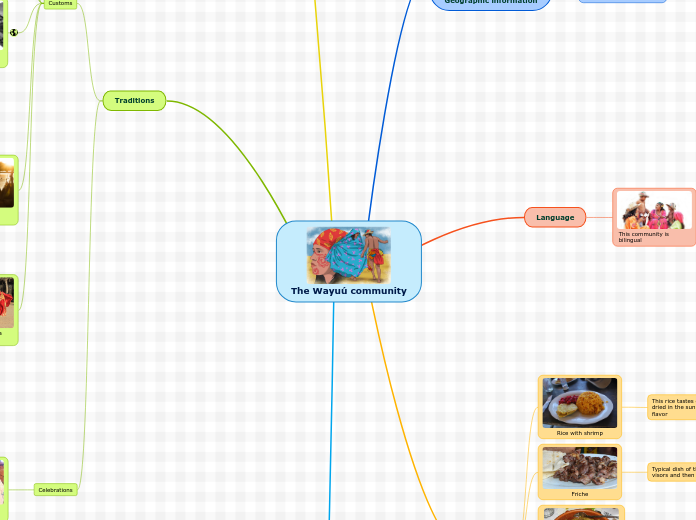jonka Luisa Grisales 5 vuotta sitten
757
The Wayuú community2

jonka Luisa Grisales 5 vuotta sitten
757

Lisää tämän kaltaisia
Carracho
Colourful and knitting hat with a peacock's feather
Original Wayuco with his belt
A shawl in the head that goes to the floor
A manta guajira
Women use maracas in their hands
Socks in the hands
A mask or somethig to hide the face
Made of Canvas or linen
Coat and jacket
Shirt with logs sleeves
Hood
Long pants
leather sandals
Uwomü
hat made of straw
Wayuco
Loincloth
White pant
White shirt
Waireñas
Leather sandals
Kapatera
a knitting bag
Colourful shawl in the head
The Kumas
Collars inherited for the ancestors
Wusi
intimate gargment
Wayushein or "Manta guajira"
loose fitting dress
The festival is celebrated every year between June 12, 13 and 14
Three days without rest full of fun, praising customs such as:
Gastronomic samples
typical dishes such as friche, mazamorra and fish
Contests
Wayuu instruments such as the kasha, the tariraü, the wontoloyaa and the turompa
Dances
Yonna or Kaulayaa
Craft samples
Wayuu backpacks give rise to a parade of colorful threads full of meaning
Competitions
shooting with cardón, wrestling, sling shooting and horse racing
Plays
children interpret the myths and legends of their culture
Majayut
the next ambassador of the Wayuu community is chosen by
her knowledge about traditions and current reality
her knowledge in the wayuunaiki language
The dance is danced on a clear and flat terrain called "el pioi"
Men have to dance with all women until they get tired
they are offered a gift at the end of the dancing
This dance is by
to start a friendly relationship
to demonstrate forces and resistances
to express thanks for what was obtained
to honor someone
to welcome a person into the community
to get a good harvest
it is represents a true farewell
because of the deceased are taken to the ancestral cemetery and buried forever
10 or 15 years after the first burial
the familiars gather to prepare the ceremony of second wake
This ceremony is the responsibility of an elderly woman of the family
she clean the remains and then place them in a crock pot
She is in charge of removing the remains of the corpse
In the Wayuú culture two waves are held
in the second the soul of the deceased arrives at the gates of Jepira
Jepira is the land of the dead
the first does not represent an eternal farewell
On the day of the burial
the deceased is taken out of the house to be taken to the cemetery
other relatives shoot into the air to shoot the dead from the ground
familiars and friends are next to the grave
At night
they meet to talk, tell jokes and drink coffee
At day
they remember to the deceased with longing
they mourn the deceased
they hold vigil the deceased
Friends and familiars of the deceased
drink large quantities of "chirrinche"
eat goat meat
settle in hammocks
The couple has to go through three process before of married ceremony
Wayuú marriage day
It consist of
delivery of the agreed dowry
a great party where the inter-family relationship is formalized
Dowry pact
It is a collection
The groom gives necklaces, animals and other goods to the bride's family
This happens because
in this culture the woman is the most important member of the family
and her departure represents a great loss for his familiars
Hand request
The young uncle is the responsible of speak with the bride's parents
He have to express the intentions of the groom with the marriage
The groom can't do this because it means disrespect for the family and tradition
the majayulu who is the adolescent woman, after her first bleeding she is forced to be locked in the house to keep her away from bad energies
in this state all the customs and traditions of her culture are transferred
the "Araña Wareke" teaches her the Wayuú knitting
the care she receives from her female relatives are:
her hair is cut so that it grows much stronger
a diet based on fermented drinks such as:
guarapo, corn chicha or juices extracted from roots
a bath to hydrate and soften all her skin
this bath is water from kutena or naked indian
they express their conception of life and everything that surrounds them
the woman is the only one who can weave
Wayuunaiki
This means: "person with good use of reasoning"
This is their official language
this has sixteen consonants
this has six vowels
The most people of this community speak it
Zulia
In the part call Guajira
The river Limón passed for the territory
Arid desert
High temperature
The desert scenary of the Guajira
Municipalities
Riohacha
Manaure
Uribia
Maicao
Fonseca
Distracción
Barrancas
Caracteristics
The river Ranchería passed for the territory
some aquifer wells
High temperatures